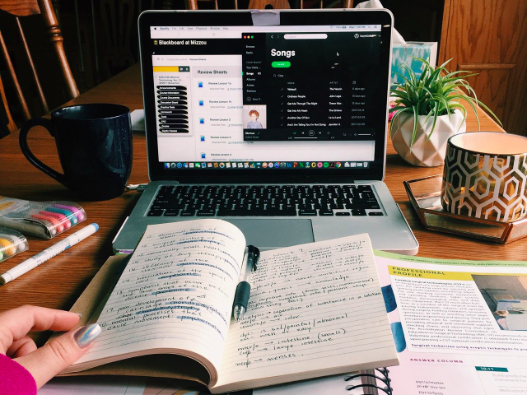How to Make the Ultimate Study Playlist

Starting in 2020, many students have claimed they need to change their study habits. But how exactly does one go about doing that? Not only are study guides and Quizlets helpful, but also music gets the brain in the right mood for concentration.
Although no one is able to completely multitask, music has been proven to be very effective for getting the mind ready for studying and tasks that require focus and cognitive thinking. But what types of music are most effective for studying? What types are distracting and captivating?
Waterfalls and nature noises have been declared the most effective way to fall asleep, setting the mind at ease and off to dreamland. However, researchers from Rensselaer Polytechnic Institute tested the effect of natural sounds on their work environment, concluding “natural sounds as masking sounds have the ability to meet standards and criteria for speech privacy which enhances cognitive functioning.”
In turn, these soothing sounds can help aid the constantly-running mind and instead set a clean-slate for the brain. This type of music is most effective for longer study days rather than a 20-minute homework assignment.
With studying and performing intensive acts, studies have shown classical music to be ideal for reaching maximum productivity. Known as the “Mozart Effect,” this method has shown that students perform 12 percent higher on exams.
Similarly, in 1993, a study was done testing the effects of Mozart’s sonata on spatial reasoning skills. For ten minutes, the music was played, and the IQ scores increased by eight to nine points. While classical music might not be the biggest trend nowadays versus an Ariana Grande song, it can be the right melody and lyric-less song to get the brain focusing on the content.
Jazz, another option for a soft, instrumental tune, has been proven ideal to reduce anxiety. According to the Healthcare Administration, “Listening to relaxing music is just as effective at reducing anxiety as a massage.” Jazz music produces alpha brain waves, making the brain “relaxed but conscious.”
While jazz may not be ideal while reading a textbook, your brain could use a little sax’ during study breaks.
Lyric-less music is a trend and common for studying, but during a very music-influenced age, it is hard to deny listening to your favorite song. However, that will cause you to listen and sing along, which will inhibit your ability to understand and retain information.
Keep in mind a few things: your study playlist should be no more than one hour, giving you a reminder to take a break and stretch for a few minutes. Additionally, the playlist should never be played at maximum volume as this prohibits the brain from thinking clearly and concisely.
In the end, the decision is up to the student, as everyone’s brain works differently. For some, music with lyrics is too distracting, causing the lyrics to monopolize the brain, rather than the topic of study. However, lyrics might trigger certain details or content, if played during studying and before the test. Ultimately, just ensure that the memorizing is saved for terms and content rather than song lyrics.

Anna, an IB senior, is excited for her fourth and final year at The Harriton Banner, returning as Executive Editor for the second year. She enjoys leading...

